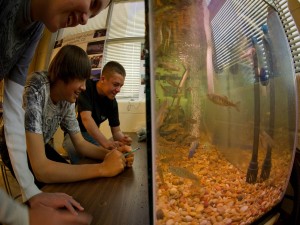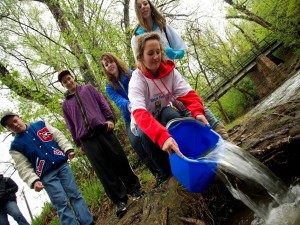 Trout Communications Award - Kirk Deeter
Trout Communications Award - Kirk Deeter
Kirk Deeter, newly appointed editor of Trout Unlimited's TROUT magazine and long-time outdoor writer for Field and Stream and other publications, was recognized for his focus on Colorado's Best Wild Places and for his ongoing support of TU in Colorado.
 Trout Conservation Award - Grand County
Trout Conservation Award - Grand County
Grand County Commissioner Nancy Stuart accepts the Colorado TU Trout Conservation Award for the county's ongoing efforts to ensure that the upper Colorado River system is protected and restored for future generations.
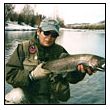 Exemplary Guide & Outfitter - Kerry Caraghar
Exemplary Guide & Outfitter - Kerry Caraghar
The fishing manager for Orvis-Cherry Creek, Kerry is a respected guide and leader in the regional fly fishing industry. He was instrumental in establishing the "Orvis 101" program to introduce new anglers to fly fishing, and is now a regular fly tyer and speaker with regional TU chapters. Kerry also and helped secure corporate grant funding for the Golden Mile habitat restoration project on his "home waters" of Clear Creek.
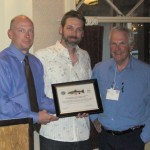 Chapter Communications Award - The Denver Chapter
Chapter Communications Award - The Denver Chapter
Denver TU was recognized for modernizing its email system with improved tracking, developing a high-quality online newsletter (“The Drift”), maintaining an attractive & useful website, and developing the "Spill or Kill Reporting Card" to engage anglers as eyes and ears on their home waters.
 Youth Education Award - Collegiate Peaks Anglers
Youth Education Award - Collegiate Peaks Anglers
When Salida schools adopted a 4-day class schedule, Collegiate Peaks saw opportunity. Working with the school district, the chapter established "Stream Explorers" to introduce students to aquatic life and fishing. Using an “inquiry-based” approach, the program focuses on hands-on learning and experimentation rather than lectures.
 Youth Education Award - Evergreen Chapter
Youth Education Award - Evergreen Chapter
ETU’s youth education efforts include: teaching entomology, conservation, fly tying and fishing to 6th graders at JeffCo Schools Outdoor Lab; an annual day-long “fish camp” with entomology, fly tying, and fishing for 30 kids; a July 4th fishing derby for 250 kids; and partnership with Camp Comfort, which hosts children who have lost loved ones; and regularly assisting with youth fishing clinics
 Outstanding Chapter Project - West Denver
Outstanding Chapter Project - West Denver
West Denver’s $300,000 Canyon Reach effort builds on its earlier "Golden Mile" in the city of Golden. The project includes 3 sections below the intersection of U.S. 6 and CO 116 and focuses on both public access and aquatic habitat. J-hooks, cross vanes, boulder clusters and toe-wood islands improved habitat, while pathways and safe-wading areas were created for young families and limited-mobility anglers.
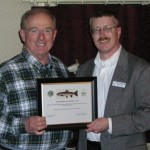 Most Improved Chapter - Rocky Mountain Flycasters
Most Improved Chapter - Rocky Mountain Flycasters
Rocky Mountain Flycasters have strengthened their chapter significantly in recent years and just completed a banner year with successful membership recruitment, an improved email newsletter and website, doubled average meeting attendance, and an increased commitment to education and conservation which has led to an 85% increase in the chapter budget. RMF has also contributed more than 5,000 volunteer hours to a slate of youth education and stream conservation projects.
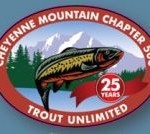 Exemplary Chapter - Cheyenne Mountain
Exemplary Chapter - Cheyenne Mountain
Cheyenne Mountain TU celebrated its 25th anniversary by hitting on all cylinders - strong chapter communications, growing attendance at events, strong revenue from fundraising, and the completion of important conservation projects on Fountain Creek and the South Platte. CMCTU has expanded its youth education programs and boosted conservation awareness by working with a local brewery to introduce a "Bear Creek Porter" to support conservation of a local cutthroat trout stream.
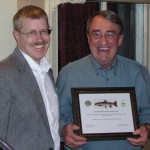
Outstanding Volunteer - Glen Edwards, West Denver
Glen has been a long-time chapter volunteer leader with the West Denver Chapter and was honored for his tireless efforts on the successful Golden Mile and Canyon Reach restoration projects, as well as for his conservation leadership within West Denver.
 Outstanding Volunteer - George Osborn, Gunnison Gorge Anglers
Outstanding Volunteer - George Osborn, Gunnison Gorge Anglers
After BLM completed a study on modifying the Relief Ditch diversion to reduce impacts on stream habitat while helping irrigators, the concept seemed doomed to languish - until George stepped up to provide steady, dedicated leadership. Construction will begin this year. George personally helped raise more than $200K in cash and in-kind donations.
 Outstanding Volunteer - John Ellis, Evergreen Chapter
Outstanding Volunteer - John Ellis, Evergreen Chapter
John has served ETU as president 5 times and Youth and Education Chair for 18 years. He helped develop the Mt Evans Outdoor Lab Program in partnership with Jeffco Schools, worked with Evergreen Parks & Rec to establish a 4th of July fishing clinic that attracts 250 kids each year, was a leader in the O’Fallon Park/Bear Creek restoration project and helped build key partnerships with Audubon, Denver Mountain Parks, and the Colorado Division of Parks and Wildlife.
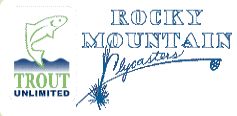 Outstanding Volunteer - Dave Piske
Outstanding Volunteer - Dave Piske
As conservation chair for the Rocky Mountain Flycasters, Dave has brought a thorough knowledge of advocacy processes and strategy to the cause of coldwater conservatin, drawing from his corporate career experience. He has represented TU in collaborative negotiations on the Halligan-Seaman Reservoir expansion, on Long Draw Reservoir reauthorization, and has helped establish partnerships with agencies from the National Parks Service to Larimer County Open Space.
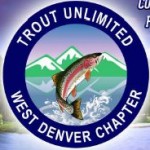 Outstanding Volunteer - Fred Portillo, West Denver
Fred was cited as a “Renaissance Man” (and all-around great guy) who has always been willing to step up to fill a need. He served the West Denver Chapter as president (2 yrs), Vice-President (2 yrs), Programs Director (2 yrs), Youth Education Programs Coordinator (1 yr), Fundraising Raffle Chair (2 yrs) and Chapter Picnic Coordinator (2 yrs). Wherever he was needed, time and again, Fred was there.
Outstanding Volunteer - Fred Portillo, West Denver
Fred was cited as a “Renaissance Man” (and all-around great guy) who has always been willing to step up to fill a need. He served the West Denver Chapter as president (2 yrs), Vice-President (2 yrs), Programs Director (2 yrs), Youth Education Programs Coordinator (1 yr), Fundraising Raffle Chair (2 yrs) and Chapter Picnic Coordinator (2 yrs). Wherever he was needed, time and again, Fred was there.








